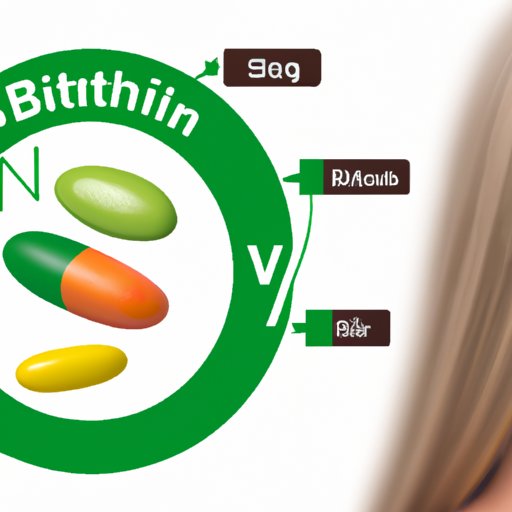
Introduction
Biotin is a B-vitamin that plays a crucial role in maintaining healthy skin, hair, and nails while also supporting energy metabolism. Despite being an essential nutrient, many people are unaware of the benefits of biotin and why it is necessary for optimal health. In this article, we will explore the various functions of biotin in our bodies, the benefits of biotin, the link between biotin and metabolism, the symptoms, causes, and treatment options for biotin deficiency, and whether biotin supplementation is necessary for better health.
What is Biotin? Understanding the Role of B Vitamin in Our Bodies
Biotin, also known as vitamin B7 or vitamin H, is a water-soluble vitamin that is vital for proper energy metabolism. It is also essential for maintaining healthy hair, skin, and nails. Biotin is involved in the breakdown of carbohydrates, amino acids, and fatty acids, which are essential for producing energy. It also plays a critical role in maintaining healthy nerves, bones, and muscles.
While our bodies can produce small amounts of biotin, we must consume it through our diet to meet our daily requirements. Biotin-rich foods include eggs, nuts, seeds, sweet potatoes, spinach, broccoli, and organ meats. However, biotin is also available in supplement form, which can be beneficial for individuals who are deficient in this essential nutrient.
The Benefits of Biotin: Why Your Body Needs This Essential Nutrient
Biotin has several benefits for overall health, including improved energy metabolism, healthy skin, hair, and nails, and improved cognitive function. It can also aid in the synthesis of fatty acids, which are crucial for the proper functioning of the nervous system and brain.
Biotin plays an essential role in the formation of keratin, a protein that is essential for healthy hair, skin, and nails. Individuals with biotin deficiencies often experience hair loss, skin rashes, and brittle nails. Adequate biotin intake is critical for maintaining strong, healthy hair, skin, and nails.
Biotin: How It Affects Your Hair, Skin, and Nails
In addition to its overall health benefits, biotin is known for improving the health of hair, skin, and nails. Biotin supports the production of keratin, which strengthens hair and nails and gives skin a healthy glow. Studies have also shown that biotin supplements can improve hair growth and thickness in individuals with thinning hair.
While biotin supplements may promote hair growth, they are not a cure-all for baldness. Biotin supplements may be beneficial for individuals with biotin deficiencies, but they may not have an impact on hair growth for individuals with other underlying conditions such as male pattern baldness.
The Link between Biotin and Metabolism: What You Need to Know
Biotin is essential for energy metabolism, and it helps our bodies convert food into energy. It is also necessary for producing glucose, which is our body’s primary source of fuel. Biotin is involved in several metabolic processes, including the breakdown and synthesis of proteins, carbohydrates, and fats.
Biotin plays a crucial role in regulating blood sugar levels and insulin sensitivity, making it an essential nutrient for individuals with prediabetes and diabetes. It can also aid in the synthesis of fatty acids, which are the building blocks of fat and the nervous system.
Biotin Deficiency: Symptoms, Causes, and Treatment Options
Biotin deficiency is relatively rare, but certain medications and medical conditions can cause a deficiency in this essential nutrient. Symptoms of biotin deficiency include hair thinning or loss, skin rashes, brittle nails, neurological symptoms such as tingling in the extremities, and depression.
The most common causes of biotin deficiency are malnutrition, prolonged antibiotic use, pregnancy and lactation, and genetic disorders. Treatment options for biotin deficiency usually involve biotin supplementation and dietary changes that include consuming more biotin-rich foods such as eggs, nuts, and seeds.
Biotin Supplements: Should You Take Them? Pros and Cons of B Vitamin Supplementation
While biotin supplements may be beneficial for individuals with biotin deficiency, they are not necessary for everyone. Most people can get sufficient amounts of biotin through their diet, and excessive biotin supplementation may have adverse effects such as acne, digestive issues, and interference with lab results.
However, biotin supplements have few risks and may offer significant benefits for individuals who have a biotin deficiency. It is essential to speak with a healthcare professional before taking biotin supplements to determine if they are necessary and to decide on the appropriate dosage.
Conclusion
Biotin is a crucial nutrient that plays a significant role in maintaining overall health and wellbeing. It supports energy metabolism, healthy skin, hair, and nails, and aids in the synthesis of fatty acids. While biotin deficiencies are relatively rare, they can cause several health concerns such as hair loss, skin rashes, and neurological symptoms.
While biotin supplements may be beneficial for individuals with biotin deficiencies, most people can get enough biotin through their diet. It is essential to speak with a healthcare professional before taking biotin supplements or making changes to your diet.





